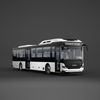Why expensive power could soon accelerate, rather than retard, the US EV adoption divide
Thus far US BEV adoption has largely been strongest in areas that have higher residential power prices. What if that became a feature, not a bug?
Swedish OEM has a lot of ground to make up

Swedish commercial vehicle manufacturer Scania, a subsidiary of German OEM Volkswagen Group’s Traton truck arm, will unveil a new electric bus platform this month with an updated electric powertrain. The new platform will begin production in 2024 and offer energy storage capacity of up to 520kWh.
It has been developed specifically for commercial heavy-duty vehicles (HDVs), as it will boast a range in optimal conditions of over 500km.
“We have had a battery-electric vehicle offering with a very similar propulsion unit before, but this is now part of the new next-generation BEV programme, so it comes with the whole package, with all the updates and improvements in every aspect compared with the previous BEV platform,” says Anders Svanbom, Scania’s technical lead on the project.
Orders for the firm’s buses took a dive in the first half of 2023, however, falling by 25pc worldwide on a year-on-year basis, including a 15pc fall in its strongest market of Latin America.
Scania is notably behind its competitors on e-bus sales in Europe. The company reported orders of only 71 ZEVs amongst its total truck and bus deliveries in Q2 this year, without specifying how many buses are included in that number, or where the ZEV buses were sold.
According to data from publisher Sustainable Bus, “with 2,567 battery-electric buses registered in the first half of 2023, the European e-bus market is growing by 45pc”. This paints a picture in which Scania, in the best-case scenario in which all its 71 ZEVs are buses sold in Europe, has only a sliver of market share.
Since 2021, the majority of European public tender processes involving procurement of bus contracts and the purchase of vehicles demand ZEV buses. Indeed, 14 EU members states plus the UK have targets of 45pc of new bus contracts being for ZEVs.
Scania therefore needs a rapid ramp-up of its electric bus platform f it wants to capitalise on public procurement contracts, which are only set to demand a higher proportion of ZEV vehicles. Perhaps anticipating investor interest in these procurement processes, Scania explicitly says that the new e-bus platform makes it “ready to compete in bus tenders”.
Market outlook
US thinktank the International Council on Clean Transportation (ICCT) reported in May this year that electric city buses had overtaken diesel buses’ market share in the EU-27+UK region.
“City buses are in a prime position for electrification; they operate predictable routes which eliminates range anxiety, they are usually stored in depots overnight where they can be charged, and they are normally publicly procured, giving their purchase access to a wider amount of capital compared to the private transport market,” the ICCT says.
Q2 also saw Scania unveil a battery cell, created jointly with Swedish battery developer Northvolt. But the lithium-ion cell has had limited lab testing, and the joint venture says only that it has “demonstrated an outstanding lifetime resulting in the capacity to power trucks for 1.5mn km”.
Insider Focus LTD (Company #14789403)